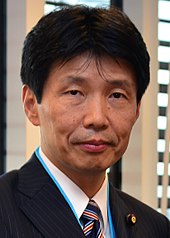Ichita Yamamoto
Ichita Yamamoto ( Japanese 山 本 一 太 , Yamamoto Ichita ; born January 24, 1958 in Kusatsu , Agatsuma County , Gunma Prefecture ) is a Japanese politician and has been the governor of Gunma since 2019. From 1995 to 2019 he was one of the two representatives of Gunma Prefecture in the Senate for the Liberal Democratic Party (LDP) , and from 2012 to 2014 Okinawa, Science and Space Minister.
Yamamoto graduated from Chūō Daigaku Law School and postgraduate studies from Georgetown University . From 1986 he worked for the kokusai kyōryoku jigyōdan (English Japan International Cooperation Agency ), the forerunner of today's kokusai kyōryoku kikō (English Japan International Cooperation Agency ), which coordinates Japanese development aid as a self-governing body on behalf of the government. In 1991 he was transferred to the headquarters of the United Nations Development Program in New York.
Yamamoto switched to active politics in the 1995 Senate election when he ran in Gunma to succeed his father Tomio Yamamoto , who had died a few months before the election , was former Agriculture Minister and Secretary General of the LDP parliamentary group in the Senate, who had represented Gunma there since 1977. Gunma elected two senators per partial election in 1995: Yamamoto won a seat with clearly the highest share of the vote (44%) ahead of the re-elected socialist incumbent Giichi Tsunoda (27%) - six years earlier, his father had only achieved the second highest share of the vote, behind Tsunoda, with a clear gap . In the 2001 election , Yamamoto and Tsunoda (now a democrat ) were re-elected in the same order (Yamamoto 40%, Tsunoda 28%). When Gunma became a single-mandate constituency in the 2007 Senate election , the Democratic Party did not put up its own opponent, only its small coalition partner NVP and the CPJ : Yamamoto was sovereignly re-elected for a third term with 62% of the vote. In the 2013 election he was re-elected with 71.9% of the vote against the Democrat Fujiko Kagaya (15.3%) and two other candidates.
In 2008 he became Deputy Minister in the Ministry of Foreign Affairs under Yasuo Fukuda's cabinet , and in 2012 in the second Abe Cabinet he became Minister of the Cabinet Office for Special Tasks (Okinawa and the Northern Territories, Science and Technology Policy, Space Policy) and was given additional responsibilities (without separate budgets from other ministries or authorities settled): for IT politics, maritime affairs and territorial conflicts. Shun'ichi Yamaguchi replaced him in a cabinet reshuffle in September 2014 . From 2016 to 2017 he was chairman of the budget committee in the Senate, he was succeeded by Genjirō Kaneko .
In July 2019, Yamamoto ran for gubernatorial election in Gunma to succeed Masaaki Ōsawa , who did not run again. The 2019 gubernatorial election coincided with the Senate election ; Yamamoto automatically lost his parliamentary seat at the beginning of the statutory gubernatorial campaign period (= candidacy for an incompatible office) on July 4th. With electoral support from the LDP and Kōmeitō , he won with a three-quarters majority against the CPJ-supported middle school teacher and trade unionist Kiyoto Ishida. He took over the governor's office on July 29th.
Web links
- Official Website (Japanese)
- Gunma Prefecture: Governor's Office (Japanese; machine translations English, Chinese, Korean, Spanish, Portuguese )
- Senate: Members, Yamamoto Ichita (Japanese, English )
- The Japan Times , Cabinet Profiles: Ichita Yamamoto (English)
Individual evidence
- ↑ Asahi Shimbun , Senate Election Results 2013: Gunma (accessed August 5, 2019)
- ↑ 三浦 靖 衆院 議員 ・ 山 本 一 太 参 院 議員 が 失職 . In: nikkei.com . July 4, 2019, Retrieved August 5, 2019 (Japanese).
- ↑ 2019 群 馬 県 知事 選 . In: NHK Senkyo Web. July 21, 2019, Retrieved August 5, 2019 (Japanese).
- ^ Ruling coalition-backed Ichita Yamamoto wins Gunma governor race. In: The Japan Times . July 21, 2019, accessed on July 24, 2019 .
- ↑ 群 馬 ・ 山 本 新知 事 が 初登 庁 副 知事 2 人 は 交代 へ . In: nikkei.com . July 29, 2019, Retrieved August 5, 2019 (Japanese).
| personal data | |
|---|---|
| SURNAME | Yamamoto, Ichita |
| ALTERNATIVE NAMES | 山 本 一 太 (Japanese) |
| BRIEF DESCRIPTION | Japanese politician |
| DATE OF BIRTH | January 24, 1958 |
| PLACE OF BIRTH | Kusatsu-machi , Agatsuma-gun , Gunma-ken |
